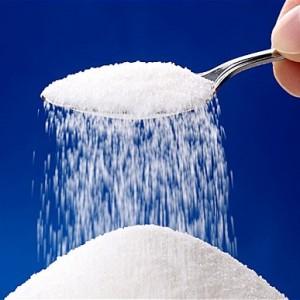Britain’s obesity crisis could be reversed within five years if food companies reduced sugar in products by 30 per cent, health experts claim as they launch a new campaign to cut intake
 Britain’s obesity crisis could be reversed within five years if food companies reduced sugar in products by 30 per cent, health experts claim as they launch a new campaign to cut intake
Britain’s obesity crisis could be reversed within five years if food companies reduced sugar in products by 30 per cent, health experts claim as they launch a new campaign to cut intake
Sugar has become as dangerous as alcohol or tobacco, academics have said as they call on the food industry to cut 30 per cent from processed in Britons’ cupboards.
Health experts claim the reduction could shave 100 calories from each person’s daily intake and reverse the UK’s growing obesity epidemic.
Later a group of health experts and academics come together to launch ‘Action on Sugar’, a campaign which is calling on the food producers to dramatically reduce levels of sugar in everyday products.
They are also asking companies to stop advertising sugary drinks and snacks to children claiming sugar has become ‘the alcohol of childhood.’
And they are calling on the government to fine those who do not meet reduction targets or impose a Sugar Tax.
Professor of Clinical Epidemiology at the University of Liverpool, UK, Simon Capewell says, “Sugar is the new tobacco.
“Everywhere, sugary drinks and junk foods are now pressed on unsuspecting parents and children by a cynical industry focussed on profit not health.
“The obesity epidemic is already generating a huge burden of disease and death.”
One in four adults in England is obese and these figures are set to climb to 60 per cent of men, 50 per cent of women, and 25 per cent of children by 2050. Three in every 10 children aged between two and 15 are overweight or obese.
Obesity and diabetes already costs the UK over £5billion every year which is likely to rise to £50 billion in the next 36 years.
Although sugary drinks are known to be a problem scientists say many people are unaware that flavoured waters, soups, ketchup and ready meals also contain large amounts of hidden sugars.
A can of Heinz tomato soup contains the equivalent of four teaspoons of sugar while a mug of Cadbury’s drinking chocolate holds six teaspoonfuls. A Yeo Valley vanilla yoghurt contains five teaspoons of sugar.
Last year a study by Oxford University suggested that a 12p tax on fizzy drinks would cut consumption by 15 per cent and mean 180,000 fewer obese adults.
The experts have calculated that reducing sugar in processed foods by between 20 and 30 per cent over the next three to five years they could remove 100 calories a day from diets, enough to halt or reverse the obesity epidemic.
They highlight children as a particularly vulnerable group because of the heavy marketing of sweets and sugary drinks towards youngsters.
Assistant Professor of Medicine at the University of Ottawa, Canada, Yoni Freedhoff; “Not only has added sugar found its way into virtually everything we eat, but worse still, the use of sugar as a means to pacify, entertain and reward children has become normalized to the point that questioning our current sugary status quo often inspires anger and outrage.
“We need to re-relegate sugar to the role of occasional treat rather than its current role of everyday, anytime, crutch”.
Professor of Paediatric Endocrinology at the University Of California, San Francisco Robert Lustig added: “Children are the primary targets of marketing campaigns, and the least able to resist the messaging.
“That makes sugary drinks like the “alcohol of childhood”, which makes them obese.”
Many companies have already signed up to the government’s Responsibility Deal to cut sugar by 10 per cent from their products but academics say it does not go far enough.
“We must now tackle the obesity epidemic both in the UK and worldwide,” said Professor Graham MacGregor,
“The present government and Department of Health Responsibility Deal has been shown to have had no effect on calorie intake and we must start a coherent and structured plan to slowly reduce the amount of calories people consume by slowly taking out added sugar from foods and soft drinks.”
Source: Daily Telegraph UK